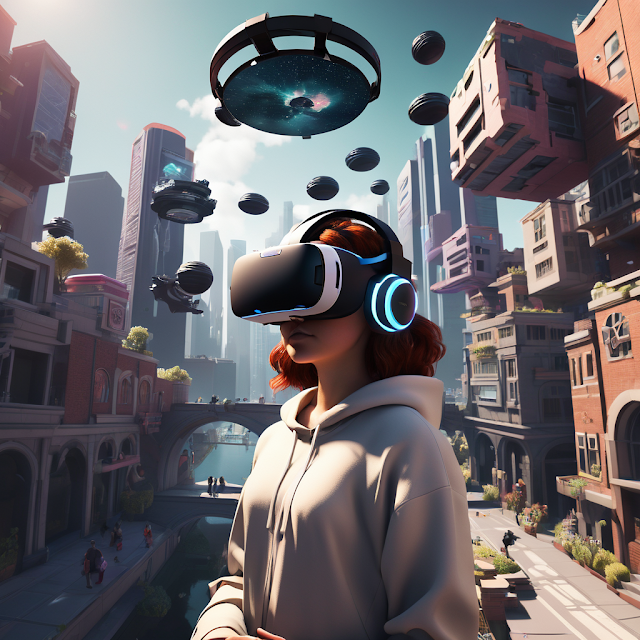Search This Blog
"Truth comes only to conquer those who have lost the art of receiving it as a friend." ~ Ravi Thakur
Featured
- Get link
- X
- Other Apps
Exploring the Metaverse: A Comprehensive Guide to Virtual Worlds and Immersive Experiences
In recent years, the concept of the metaverse has captured the imagination of millions, promising a digital realm where virtual reality (VR) and augmented reality (AR) technologies converge to create immersive experiences unlike anything we've seen before. In this comprehensive guide, we'll delve deep into the metaverse, exploring its origins, potential impact on industries, and the exciting possibilities it holds for the future.
What is the Metaverse?
The metaverse is a collective virtual space comprised of interconnected digital environments, where users can interact with each other and with digital objects in real-time. Think of it as a convergence of virtual reality, augmented reality, social media, gaming, and e-commerce, all seamlessly integrated into one immersive experience!
Origins and Evolution
The concept of the metaverse was first popularized by Neal Stephenson's 1992 science fiction novel "Snow Crash," depicting a futuristic virtual world where people escape reality and engage in various activities. Since then, the idea has evolved from fiction to reality, fueled by advancements in technology and the growing demand for immersive experiences.
Key Components of the Metaverse
1. Virtual Worlds: These are digital environments that users can explore and interact with, ranging from fantastical landscapes to realistic replicas of real-world cities.
2. Avatar-Based Interaction: Users navigate the metaverse through personalized avatars, representing themselves in the digital space and interacting with other users and objects.
3. Social Interaction: The metaverse fosters social connections and collaboration, allowing users to meet, chat, and engage in shared activities with others in virtual spaces.
4. Economy and Commerce: Within the metaverse, users can buy, sell, and trade digital goods and services, creating a virtual economy that mirrors real-world markets.
5. Content Creation and User-Generated Content: Users have the ability to create and share their own content within the metaverse, from virtual art installations to immersive gaming experiences.
Potential Impact on Industries
1. Gaming: The gaming industry stands to benefit greatly from the metaverse, as it provides a platform for developers to create immersive multiplayer experiences and virtual worlds that blur the lines between reality and fantasy.
2. Entertainment: Film, television, and music industries can leverage the metaverse to create interactive experiences and immersive concerts, bringing entertainment to new heights of interactivity and engagement.
3. Education: The metaverse has the potential to revolutionize education by providing immersive learning environments, virtual classrooms, and interactive simulations that cater to diverse learning styles.
4. Retail and E-Commerce: Virtual shopping experiences within the metaverse could transform the way we shop, allowing consumers to browse virtual stores, try on virtual clothing, and purchase digital goods with cryptocurrency.
How to Navigate the Metaverse
1. Choose Your Platform: There are several platforms and virtual worlds that make up the metaverse, each offering unique experiences and communities. Some popular examples include Second Life, Decentraland, and Roblox.
2. Create Your Avatar: Personalize your avatar to reflect your identity and preferences, choosing from a variety of customization options for appearance, clothing, and accessories.
3. Explore and Interact: Dive into virtual worlds, explore new environments, and interact with other users through chat, voice communication, and collaborative activities.
4. Get Involved: Engage with communities, attend virtual events and concerts, participate in virtual economies, and contribute to the creation of user-generated content.
The Future of the Metaverse
As technology continues to advance and adoption grows, the metaverse holds the potential to become an integral part of our daily lives, transforming the way we work, play, socialize, and conduct business. From virtual meetings and conferences to immersive entertainment experiences and virtual tourism, the possibilities are endless.
The metaverse represents a bold new frontier in the realm of digital experiences, offering unparalleled opportunities for creativity, collaboration, and exploration. Whether you're a gamer, a socialite, an entrepreneur, or an educator, the metaverse invites you to step into a world where the boundaries between the physical and the digital blur, and the only limit is your imagination.
- Get link
- X
- Other Apps
Popular Posts

The One On Why Uganda Produces Shitty Ads
- Get link
- X
- Other Apps

Of Australian Bogans Masquerading As Creatives In Nairobi Agencies
- Get link
- X
- Other Apps


Comments
Post a Comment